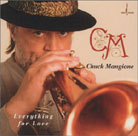February 2001
On Everything for Love, we get Chuck on his trademark flugelhorn, blowing his form of contemporary jazz. The only differences between Mangione and all those other contemporary jazz artists are that, one, Mangione has been doing this for thirty-odd years now and, two, he comes to the form having started out playing be-bop before honing his own unique style. While many dismiss Mangione as just another Kenny G type player, I hear a lot of Miles Davis in his horn work. Not that he’s a Davis clone -- no, no, no. He simply understands how much can be communicated with just a few notes played with feeling and talent (qualities Mangione has had and used for years). For example, take "Slo Ro:" If you close your eyes and concentrate, you might almost see the ghost of Miles nodding in agreement in the background. Mangione once again surrounds himself with a cast of similarly talented musicians. If you’ve listened to Mangione in the past, then Gary Niewood’s name and sound will be very, very familiar to you. He can still stun you with his well-placed soprano or tenor sax notes -- he also plays flute on "Amazing Grace." Similarly, guitarist Grant Giessman helps to keep the tempo purring along -- never pushing, but always encouraging the others. Many of the tracks on Everything for Love are reminiscent of Mangione albums past. The cut "I Do Everything For Love" could have come right out of Chase the Clouds Away. But he's obviously learned some new tricks: Dig the Far Eastern flavor he adds to the cut "Seoul Sister." Comparing the sonics of this Chesky 24-bit/96kHz release to those of the Telarc DSD discs I’ve had the chance to listen to lately was an interesting exercise. Both companies cater to the audiophile community, which shows in the clarity of the recordings; yet there are distinct differences between their discs, and not limited to the DSD vs. 24/96 recording techniques. Telarc is more than willing to use multi-track and overdubbing, while Chesky opts for more of a single microphone, direct to tape style. And while Telarc records in many different studios, with the varying sonic signatures that brings, Chesky tends to use a few favored venues, such as St. Peters Episcopal Church in the Chelsea section of NYC, which is used here. Also Chesky’s sound tends to be more mid hall, while Telarc places you in the front row. Neither is wrong, they are just different. Here, there is snap to the snare drums and a metallic ring to the cymbals (along with the appropriate decay). But most importantly, there is a bite to Mangione’s flugelhorn -- you can almost hear the air moving through it before exiting the bell. The same is true of Niewood’s sax playing. Everything for Love is the perfect music to listen to on an early Sunday morning, while you digest both breakfast and the Times. It was a treat to reacquaint myself with Chuck Mangione -- I’ve been a fan for many years, and I’ve always wondered what happened to him. Thanks to Chesky Records, I’ve gotten my answer. He has simply been waiting on someone with the intelligence of David and Norman Chesky to offer him the chance to lay down some more music. Welcome back, Chuck; and thank you, Chesky. GO BACK TO: |
 Chuck Mangione - Everything for Love
Chuck Mangione - Everything for Love![[Reviewed on 24/96 dvd]](../format/2496dvd.gif) Mangione, an erstwhile be-bopper, found his niche many
years ago playing soft, slow, thoughtful music that was full of feeling but short on
fireworks. That’s no knock on Chuck: He found a style that works for him and
he’s labored hard perfecting it.
Mangione, an erstwhile be-bopper, found his niche many
years ago playing soft, slow, thoughtful music that was full of feeling but short on
fireworks. That’s no knock on Chuck: He found a style that works for him and
he’s labored hard perfecting it.